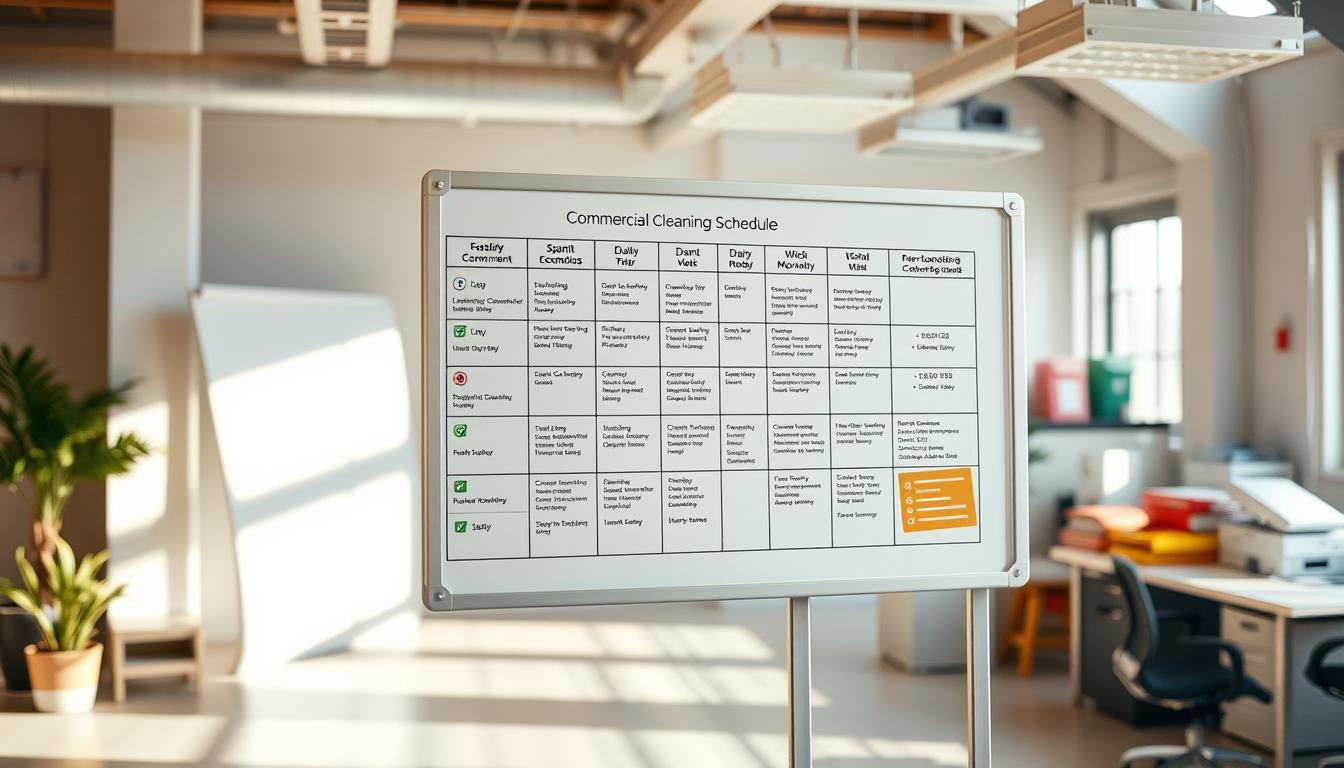10 Expert Commercial Cleaning Tips for Atlanta Facility Managers in 2025
Maintaining a clean commercial space is more than just good practice—it’s essential for health, safety, and professional appeal. For Atlanta facility managers overseeing busy warehouses, office buildings, or retail locations, staying ahead of grime and chaos means adopting smart, efficient cleaning strategies. That’s why we’ve compiled these 10 expert commercial cleaning tips tailored specifically for businesses in Atlanta, Georgia.
Atlanta’s humid climate, high-traffic zones, and diverse business environments require a specialized approach to facility maintenance. From floor stripping and waxing to deep cleaning high-touch surfaces, proactive cleaning practices are critical. If you manage a property in the Metro Atlanta area, you understand how a poorly maintained floor or workspace can impact safety, employee productivity, and client impressions.
Partnering with professional services like 360 Floor Cleaning Services in Atlanta ensures you’re using the right methods, equipment, and frequency for each surface and space. Whether you’re dealing with commercial floor cleaning, industrial janitorial services, or nightly retail store cleanings, these tips will help you implement a winning strategy. Our team uses industrial-grade scrubbers, eco-friendly disinfectants, and customized scheduling that fits your building’s needs and operating hours.
Don’t wait until stains, odors, or slippery floors become a liability. Instead, take charge with a maintenance plan designed for Atlanta’s commercial spaces. We’ve also included insights on how to work more efficiently with your cleaning provider, improve air quality, reduce downtime, and ensure compliance with Georgia’s sanitation standards.
If you’re a facility manager, property owner, or operations director in Atlanta, this guide is built for you. Let’s keep your space clean, compliant, and always client-ready.
Did you know 94% of people feel safer and happier at work when it’s clean? As we head into 2025, this fact shows how important a good cleaning schedule is for Atlanta facility managers. Clean spaces boost employee work and make customers feel good about their visits.
Experts like 360 Floor Cleaning Services share key tips for Atlanta’s unique cleaning needs. Managing a cleaning schedule well is key to keeping places clean and running smoothly. These tips are a must for any manager wanting to excel.
Key Takeaways
- Cleanliness is key for a safe and happy workplace.
- A good cleaning schedule boosts employee work.
- Getting everyone involved in the cleaning plan works better.
- Regular floor cleaning in Atlanta keeps places looking and feeling good.
- Checking and improving the cleaning plan often is smart.
- Using pros like 360 Floor Cleaning Services makes cleaning easier.
Understanding the Importance of a Cleaning Schedule
A cleaning schedule is key to a healthy and productive work space. It keeps facilities clean and welcoming. A regular cleaning schedule boosts the look and feel of any place.
Regular cleaning fights off dust, allergens, and germs. This makes a place more inviting for everyone. Studies show that clean spaces lead to happier and more productive people.
Every area needs different cleaning levels, based on how much it’s used. Knowing this helps businesses clean better and work more efficiently.
A cleaning schedule helps keep track of maintenance. It makes sure important areas get cleaned. This way, places stay safe and look good for everyone.
| Benefits of a Cleaning Schedule | Impact on Commercial Spaces |
|---|---|
| Promotes Health | Reduces the risk of illness in employees and clients |
| Enhances Productivity | Research links cleanliness to increased employee efficiency |
| Improves Aesthetics | Creates a welcoming environment for clients and visitors |
| Ensures Compliance | Meets health codes and regulations |
Creating a Customized Cleaning Plan
Creating a cleaning plan that fits your facility is key. It starts with knowing what your space needs. This can change a lot based on the type, size, and how often it’s used. By understanding your space’s needs, you can make a plan that really works.
Assessing Your Facility’s Unique Needs
Every place has its own cleaning challenges. How busy it is and when can affect how you clean. For example, warehouses and retail stores need different cleaning plans because of their different uses and foot traffic.
Doing a deep dive into these factors helps figure out how often and how to clean. This makes your space cleaner and safer.
Involving Stakeholders in the Planning Process
Getting everyone involved in making a cleaning plan is important. This means working with employees and managers. It helps make sure all cleaning needs are met.
When everyone contributes, you get a better cleaning schedule. This makes your space cleaner and more inviting. Listening to everyone’s ideas helps make a more complete cleaning plan.
Defining Your Commercial Cleaning Schedule
Creating a commercial cleaning schedule is key to keeping your space clean and inviting. It involves setting up different cleaning tasks for various areas. Knowing how often to clean each spot is vital for good hygiene and function.
Different places need different cleaning schedules. For example, busy areas might need daily cleaning. Less busy spots might only need cleaning weekly or monthly. A clear cleaning schedule helps keep everything tidy and consistent.
| Cleaning Frequency | Tasks Included | Recommended for |
|---|---|---|
| Daily | Dusting, vacuuming, restroom sanitization | Retail stores, restaurants |
| Weekly | Deep cleaning carpets, window washing | Offices, conference rooms |
| Monthly | High dusting, detailed equipment cleaning | Warehouses, manufacturing plants |
Having a clear cleaning schedule keeps your facility clean and running smoothly. A structured cleaning plan makes your routine more effective.
Daily Cleaning Checklist for Commercial Properties
Keeping a commercial property clean is key. A daily cleaning checklist helps keep it hygienic and looking good. It also stops big maintenance problems before they start. Here are some important tasks for daily cleaning.
Essential Tasks for Daily Operations
- Quick pickups of debris and spills throughout high-traffic areas.
- Vacuuming or sweeping to keep floors clean and safe.
- Mopping or using appropriate cleaning solutions to maintain floor hygiene.
- Cleaning and disinfecting high-touch areas such as doorknobs, light switches, and elevator buttons.
- Managing waste by emptying trash bins and ensuring recycling practices are followed.
Benefits of Maintaining a Daily Cleaning Routine
Following a daily cleaning routine has many advantages. It improves air quality and makes the workplace healthier. Clean and organized spaces make employees and clients happy.
With a daily cleaning routine, properties last longer. This means less money spent on repairs and replacements.
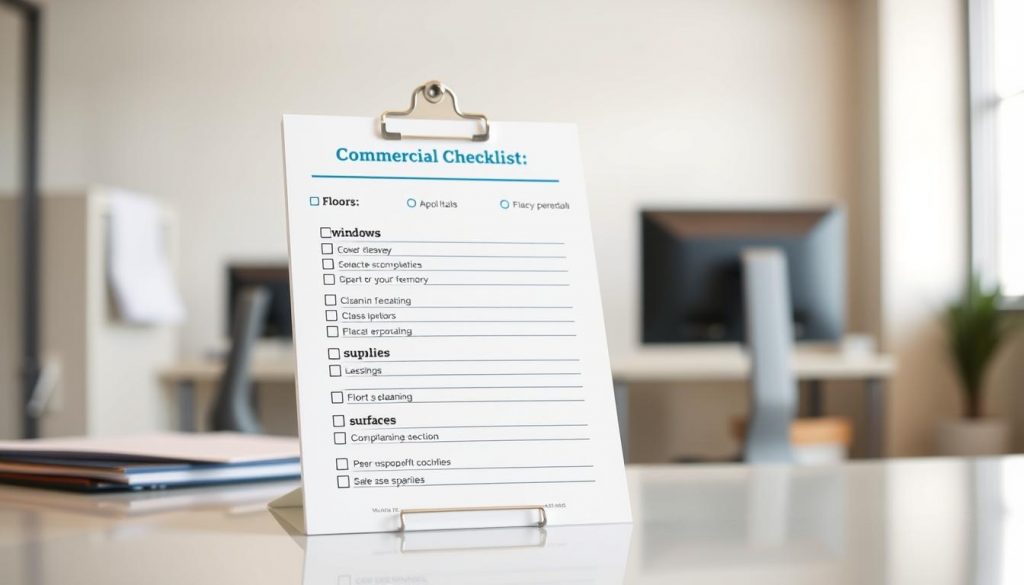
| Task | Frequency | Purpose |
|---|---|---|
| Quick pickups | Daily | Prevent hazards and maintain cleanliness |
| Vacuuming/Sweeping | Daily | Remove dust and dirt |
| Mopping | Daily | Maintain floor hygiene |
| Disinfecting high-touch areas | Daily | Reduce germs and viruses |
| Waste management | Daily | Ensure a clutter-free environment |
Janitorial Cleaning Schedule Best Practices
Creating a good janitorial cleaning schedule means knowing how much people move around in a space. You need to figure out where the most people go and how often to clean those places. This way, you keep everything clean and make the space better for everyone.
Choosing Frequency Based on Traffic Patterns
Places like lobbies and entrances need to be cleaned a lot because lots of people go through them. They get dirty fast, so they need more cleaning. Hallways and break rooms should be cleaned every day. But rooms like conference rooms or private offices might not need cleaning as often, depending on how much they’re used.
By customizing your cleaning schedule, you make sure everything gets cleaned without wasting time or effort. This way, no spot is left behind.
Incorporating Seasonal Adjustments
Cleaning needs to change with the seasons. Seasonal cleaning adjustments mean more cleaning during busy times like back-to-school or holidays. Also, bad weather means more cleaning, like when it snows or rains a lot. Planning for these changes makes your cleaning schedule more effective.
This keeps your space clean and safe for everyone. For more tips on keeping your place clean, check out this resource on cleaning high ceilings.
Office Cleaning Frequency: How Often is Enough?
Finding the right cleaning schedule for your office is key to keeping it clean and productive. The number of employees and the type of work matter a lot. Places with lots of people coming and going need to be cleaned more often.
The cleaning frequency chart below gives some good starting points for different office types:
| Area | Recommended Cleaning Frequency |
|---|---|
| Restrooms | 3-4 times daily |
| Break Rooms | Daily |
| Conference Rooms | After each use |
| Workstations | Weekly |
| Floors | Daily for high-traffic areas; Weekly for less frequented spaces |
Knowing when to clean commercial floors is important. Regular mopping and vacuuming keep floors clean and extend their life. It also helps keep the office healthier by reducing germs and allergens.
By looking at these factors and following these guidelines, managers can make a cleaning plan that works best for their office. This helps keep everyone productive and happy.
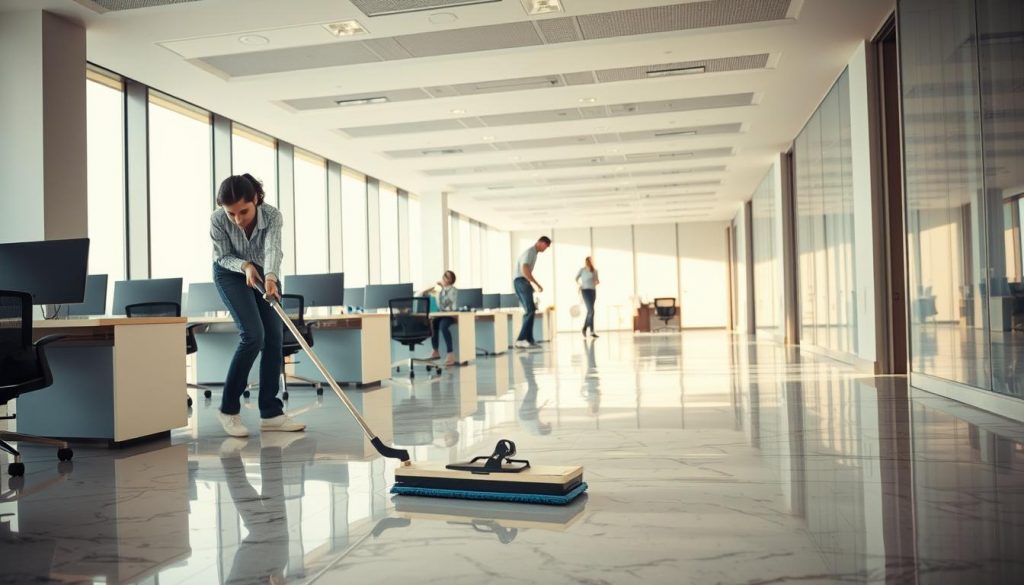
Managing a Cleaning Schedule for High-Traffic Areas
Keeping high-traffic areas clean is key for any business. Knowing where these spots are helps managers plan better cleaning schedules. Places like entrances, hallways, restrooms, and break rooms need extra care because they get a lot of foot traffic.
Types of High-Traffic Areas in Commercial Buildings
Spotting high-traffic areas means watching how people move. In commercial buildings, you’ll often find:
- Entrances and exits
- Elevator lobbies
- Restrooms
- Break rooms
- Meeting rooms
Strategies for Enhanced Cleaning in Busy Zones
There are smart ways to keep busy zones clean and hygienic. Some good strategies include:
- Clean more often based on how much they’re used.
- Use employee feedback to change cleaning plans.
- Clean during quiet times to avoid disturbing people.
- Check areas in real-time to spot where they need extra cleaning.
360 Floor Cleaning Services offers custom solutions for these needs. They make sure high-traffic spots stay clean and welcoming.
Developing an Effective Facility Maintenance Schedule
Creating a detailed facility maintenance schedule is key for any commercial property’s smooth operation. It includes both cleaning and checking essential systems like HVAC and plumbing. This way, you focus on preventing problems instead of just fixing them.
Regular checks can spot issues early, saving you from expensive repairs later. By matching your maintenance schedule with cleaning, you improve safety and looks. Clean spaces are not just nice to look at; they’re also healthier for everyone.
Having a maintenance plan helps you keep track of your work. It logs what’s done and what’s next. Plus, it helps your facilities last longer and avoids sudden breakdowns.
Getting help from professionals can really help. For example, learning about the benefits of regular floor cleaning is easy. Just check out this resource. Sticking to a maintenance and cleaning schedule keeps everything running smoothly.
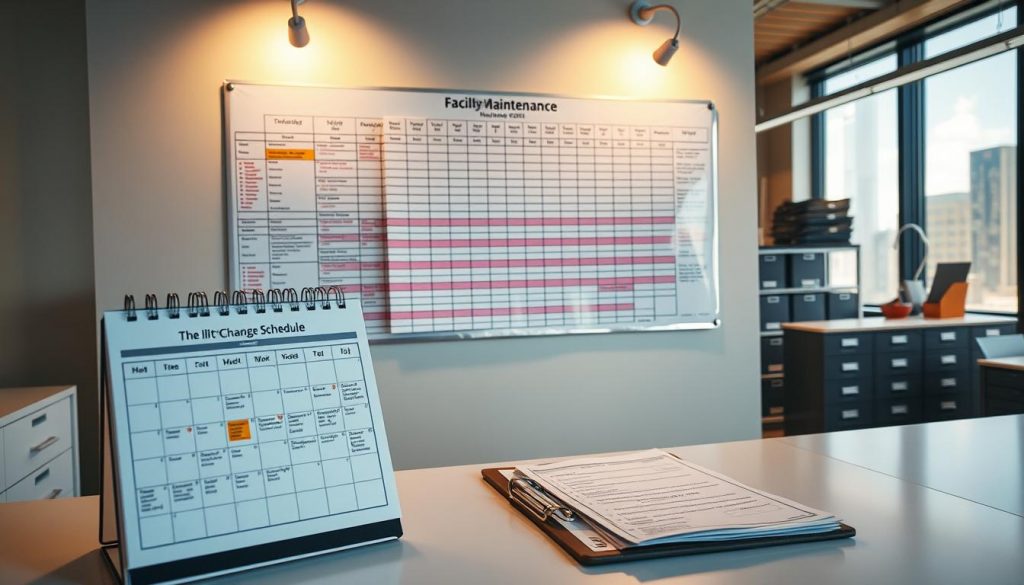
Utilizing a Commercial Cleaning Checklist Template
Using a commercial cleaning checklist template makes cleaning teams more efficient. It ensures every task is done, keeping facilities clean and consistent. This method also helps new staff learn their roles quickly.
Managers can assign tasks, track progress, and check if cleaning is done right. This is very helpful for big places where it’s hard to keep an eye on everything.
Checklist systems have many benefits. They make sure every area is cleaned, which is key for a clean environment. Digital tools can make checklists interactive, keeping reports up to date and accurate.
| Checklist Aspect | Benefits |
|---|---|
| Standardization of Tasks | Promotes uniformity across cleaning operations, improving quality control. |
| Accountability | Clear tasks ensure everyone knows what to do. |
| Training Aid | New employees learn quickly, saving time. |
| Progress Tracking | Managers can see what’s done and what needs work. |
In summary, using a commercial cleaning checklist template is smart. It saves resources and boosts cleanliness. This approach makes cleaning more effective and keeps places healthy for everyone.
Weekly Cleaning Routine for Businesses
A good weekly cleaning routine for businesses is key to a healthy and welcoming space. By planning cleaning tasks for each day, all areas get the care they need. This approach keeps your facility looking great and clean.
Organizing Tasks Throughout the Week
To make your weekly cleaning routine better, split tasks across the week. Here’s a plan:
- Monday: Dusting and sanitizing common areas
- Tuesday: Deep cleaning restrooms
- Wednesday: Vacuuming high-traffic carpeted areas
- Thursday: Mopping hard floors
- Friday: Kitchen cleaning and waste disposal
- Saturday: Window cleaning and surface polishing
- Sunday: Maintenance inspections and supply restocking
Benefits of Consistency in Cleaning
Keeping up with cleaning is vital for your facility’s health. Regular cleaning stops dirt and debris from building up. This prevents bigger problems later.
Also, a consistent cleaning schedule boosts morale. A clean workspace makes everyone feel better and work more efficiently.
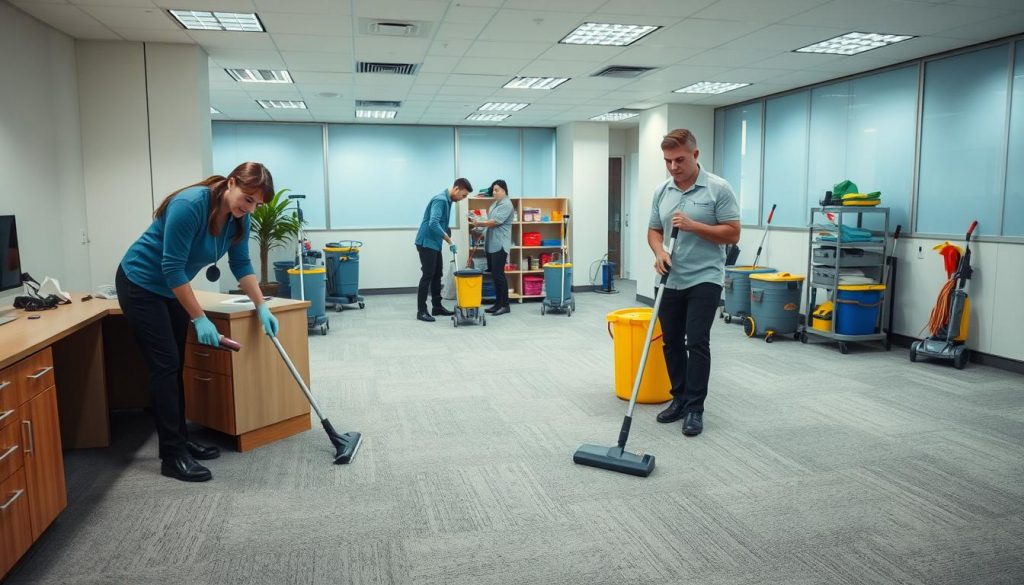
With a clear plan for cleaning tasks, your business can keep its space in top shape. This saves money and improves your company’s image.
Monthly Office Cleaning Guide for Facility Managers
A detailed monthly office cleaning guide is key for facility managers. It helps keep the office spotless. Unlike daily or weekly cleaning, monthly tasks focus on deep cleaning and upkeep. This boosts the office’s hygiene, making it healthier for everyone.
Facility managers can improve cleaning by using specific monthly checklists. For example, carpet cleaning removes stains and makes carpets last longer. Also, washing windows lets in more natural light, making the office feel more lively.
Other monthly tasks include dusting high places, cleaning air systems, and sanitizing gadgets. Following these tips helps maintain a clean office. It also makes employees happier and more productive.
Establishing a Commercial Cleaning Frequency Chart
Creating a commercial cleaning frequency chart is key for facility managers. It helps them plan cleaning schedules better. This chart shows when different areas need cleaning based on their use and surfaces.
When making these charts, several things matter. First, knowing what each area needs is important. For example, places like restrooms and kitchens need more cleaning than offices or meeting rooms. Next, figuring out the surfaces in each area helps pick the right cleaning products and methods.
Having a good cleaning frequency chart leads to cleaner and healthier spaces. It also makes clients and employees happier. With a clear plan, managers can keep places clean and use resources wisely, making sure every area gets the care it needs.
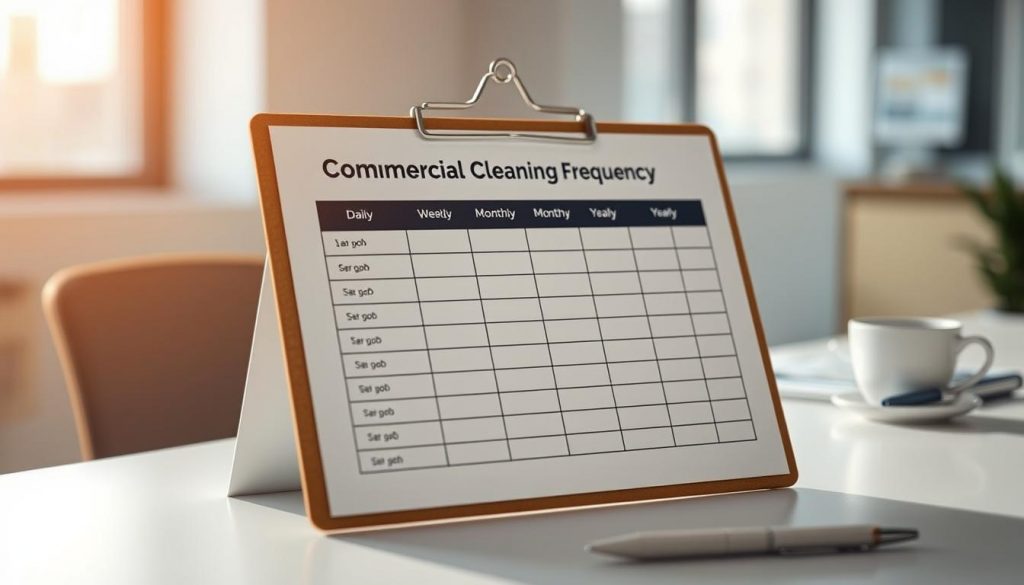
Floor Cleaning Services Atlanta: Choosing the Right Provider
Finding the right cleaning service is key to keeping your floors clean and looking good. Atlanta has many options, but choosing based on quality and skill is important. Look at their experience, the equipment they use, and what others say about them. This careful choice will help you find the best floor cleaning service in Atlanta.
Evaluating Professional Janitorial Services in Atlanta
When looking at janitorial services in Atlanta, check their experience with different floors and cleaning methods. Choose companies that use the latest equipment and green cleaning products. Reading reviews and doing research will help you find a service that consistently does a great job.
Benefits of Local Expertise
Local cleaning services know what Atlanta businesses need. Companies like 360 Floor Cleaning Services understand the city’s unique challenges. Their local knowledge helps them create cleaning plans that work best for Atlanta’s floors.
Planning for Industrial Cleaning Needs
Planning for industrial cleaning is key to a safe and efficient work area. An effective cleaning calendar helps keep tasks on track. It accounts for the unique challenges of machinery and high foot traffic.
Regularly checking the cleaning needs of industrial facilities is vital. It helps spot areas needing extra care, like production floors and storage areas.
When planning, it’s important to follow safety rules and standard procedures. This means setting up a routine for both regular and emergency cleaning. This approach ensures the space works well.
Tools like software can help with planning. They make it easier to manage cleaning tasks. This helps team members stay on the same page about cleaning duties.
| Task Type | Frequency | Key Considerations |
|---|---|---|
| Daily Maintenance | Every working day | Focus on high-traffic areas, such as entrances and restrooms. |
| Deep Cleaning | Weekly | Includes machinery and equipment cleaning; adherence to safety protocols is critical. |
| Seasonal Cleaning | Quarterly | Address dust accumulation and explore preventive measures for equipment. |
| Emergent Cleaning | As needed | Respond to spills, accidents, or unexpected equipment malfunctions. |
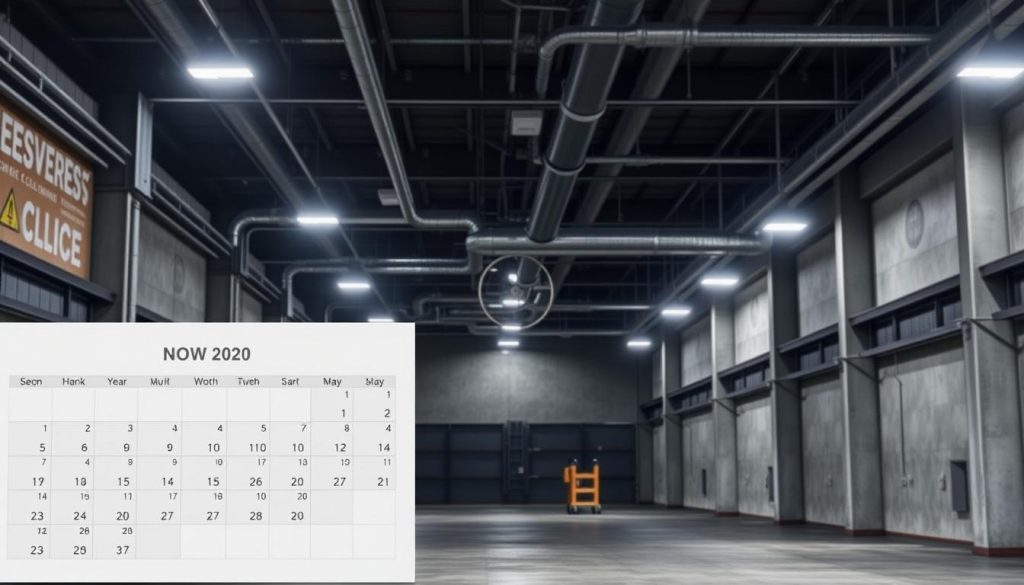
Best Commercial Cleaning Plans for Various Facilities
Understanding the cleaning needs of different spaces is key in facility management. The best commercial cleaning plans offer tailored solutions. For offices, keeping things tidy boosts productivity and happiness among employees. Plans might include cleaning desks, carpets, and restrooms regularly.
Retail spaces need flexible cleaning due to changing customer numbers. They focus on floor care, window washing, and disinfecting high-touch areas. Doing these tasks when it’s quiet helps keep things clean without interrupting business.
Industrial sites need strong cleaning plans to meet safety and equipment standards. These plans often include special cleaning for equipment and waste. This ensures a clean and safe place to work, helping managers keep things running smoothly.
Cleaning Schedule Management: Tips for Success
Managing a cleaning schedule is key to keeping commercial spaces clean and efficient. By using successful cleaning management tips, you can improve your facility’s upkeep. This also helps create a healthier environment for everyone.
Here are some strategies to boost your cleaning operations:
- Utilize Technology: Use scheduling software to send reminders and track cleaning tasks. This makes sure tasks are done on time and helps monitor the cleaning process.
- Regular Reviews: Check your cleaning schedule often to meet your facility’s changing needs. You might need to make changes as traffic patterns or seasons change.
- Staff Training: Teach your cleaning staff how to manage their schedule well. Give them checklist templates to follow. This helps them know their daily tasks and keeps cleaning consistent.
- Feedback Loops: Set up a way for employees to give feedback on cleaning. This feedback can help you improve your cleaning schedule management.

Being organized and regularly checking your processes is key to successful cleaning management. By focusing on effective schedule control, facility managers can keep their space clean and welcoming for all.
| Successful Cleaning Management Tips | Benefits |
|---|---|
| Utilizing technology for scheduling | Improves efficiency and accountability |
| Regular schedule evaluations | Ensures adaptability to facility needs |
| Employee training on cleaning protocols | Promotes consistency and quality in cleaning |
| Implementing feedback mechanisms | Enhances cleaning effectiveness and satisfaction |
Key Takeaways for Atlanta Facility Managers
Effective cleaning strategies are vital for facility managers. A good cleaning schedule boosts cleanliness and efficiency. Managers in Atlanta should keep these key points in mind to improve their cleaning.
- Customization is key. Make cleaning plans that match each facility’s needs.
- Check high-traffic areas often to see what cleaning they need.
- Listen to what stakeholders say to make cleaning better.
- Use local knowledge to follow the best cleaning practices for Atlanta.
- Use checklists to keep cleaning consistent and complete.
By following these tips, Atlanta facility managers can make spaces that are clean, welcoming, and efficient. Investing in good cleaning strategies shows a commitment to quality. This commitment improves how well things run.
Conclusion
An effective commercial cleaning schedule is key for a healthy and welcoming space. It boosts productivity and improves how people see your facility. By using the tips from this article, managers can tailor cleaning to their business’s needs.
Looking back, a good cleaning plan is essential for lasting benefits. A regular cleaning schedule makes a place safe and inviting. This is important in today’s competitive world. Managers should make cleanliness a big part of their strategy.
If you need a cleaning plan that fits your business, contact 360 Floor Cleaning Services. Call them at 404-991-8895 for a free estimate or to set up a visit. This can start a cleaning routine that meets today’s facility demands.
FAQ
What is a typical commercial floor cleaning schedule?
A typical commercial floor cleaning schedule includes daily tasks like sweeping and mopping. Deep cleaning is done weekly or monthly, depending on the floor type and traffic. High-traffic areas get special attention.
How do I create a janitorial cleaning schedule for my office?
To make a good janitorial cleaning schedule, first measure your office’s size and how busy it is. Use a cleaning checklist template to plan out daily, weekly, and monthly tasks. Make sure to focus on busy areas first.
What factors determine office cleaning frequency?
Several things affect how often you need to clean your office. These include the number of employees, what kind of work is done, and the office layout. Busy areas might need daily cleaning, while others can be done weekly or monthly.
What should be included in a daily cleaning checklist commercial?
A good daily cleaning checklist should cover vacuuming, dusting, sanitizing bathrooms, and taking out the trash. This keeps your office clean and consistent.
How often should I clean commercial floors?
How often you clean commercial floors depends on how much they’re used. Busy spots might need daily cleaning, while less busy areas can be cleaned weekly or monthly. Adjust based on your facility’s needs.
What are customized cleaning plans?
Customized cleaning plans are made just for your facility. They consider how often areas are used and what people need. This ensures your space is clean and well-maintained.
What is the purpose of a facility maintenance schedule?
A facility maintenance schedule helps organize cleaning with inspections and upkeep of systems like HVAC and plumbing. It keeps your facility clean and running smoothly.
How do I manage a cleaning schedule for high-traffic areas?
To manage cleaning in busy areas, increase how often you clean based on feedback and observations. Adjust tasks as needed to keep these areas clean and safe.
What should a monthly office cleaning guide include?
A monthly office cleaning guide should include deep cleaning tasks like carpet cleaning, window washing, and thorough dusting. These tasks help keep your office in top shape.
How can I evaluate professional janitorial services in Atlanta?
To evaluate janitorial services in Atlanta, look at their experience, customer feedback, and services offered. Choose companies like 360 Floor Cleaning Services known for their local reputation and ability to meet your cleaning needs.
